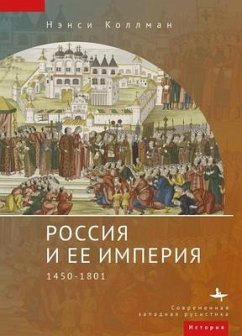The Russian Empire 1450-1801 surveys early modern Russia as an "empire of difference," that is, the government ruled the empire primarily by tolerating the great cultural, linguistic and religious diversity of its subject peoples. Over its many lands the Moscow center used a combination of coercion, cooptation and supranational ideology to maintain power, and the book explores each of those themes. The Moscow government did not hesitate to use violence and oppression to conquer and subdue territories; it coopted elites into the imperial nobility and local administrations; it projected an image of a benevolent tsar who protected his people and used architecture and ceremony to project that unifying ideology.
Hinweis: Dieser Artikel kann nur an eine deutsche Lieferadresse ausgeliefert werden.
Hinweis: Dieser Artikel kann nur an eine deutsche Lieferadresse ausgeliefert werden.








